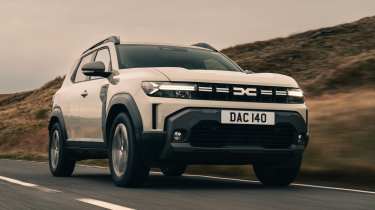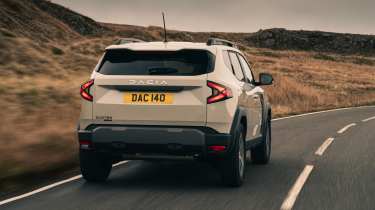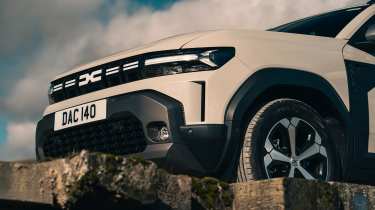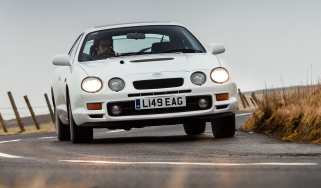New Dacia Duster 2024 review – great value, essential motoring
The previous Dacia Duster became an unlikely evo hero when we ran on our Fast Fleet – this new one is better still
The Dacia Duster isn’t a car that epitomises the thrill of driving; of course it isn’t. But at a time when the industry is churning out increasingly bloated, complex, heavy and expensive cars, the back-to-basics Duster is a product we can get behind at evo. Cleverly conceived, functional and unpretentious, we’d quite happily run one alongside faster and more exciting machinery. In fact, we did just that in 2020, when a Duster joined our long-term test fleet and completely won us over. ‘If you’re looking for a humble yet well resolved car that fulfils every aspect of family life, delivers plenty of harmless fun and possesses a genuine element of cult appeal then you’d find a four-wheeled friend in the Duster,’ reported Richard Meaden at the time.
Now there’s a new one, and the recipe is very much the same. At £18,745 it’s still brilliantly affordable (and £2k less than a Volkswagen Polo), and it’s still been designed with, first and foremost, utility in mind. But this time around, you sense that Dacia has had more freedom to inject more desirability and clever thinking into the package.
The new Duster is the same length as the car it replaces, but it looks more substantial somehow, with a blockier, tougher aesthetic. Those elements aren’t just for show, either – Dacia promises that this new model is more durable thanks to underbody shields and protection across the front and rear bumpers. The plastic cladding is the same colour all the way through, too, meaning any scrapes and scratches won’t be as noticeable.
More reviews
Beneath that new skin is Renault’s CMF-B platform, which also underpins the Sandero and Jogger. The architecture is a step forward for refinement and dynamics, according to Dacia, but the Duster still isn’t exactly a polished, precision driving tool. It requires a degree of effort and thought from the driver, but just like the old one, it can be rewarding in its own peculiar way.
There’s a good view out from the elevated driving position, and refreshingly, the Duster doesn’t take up much space on the road. As a result, you can plan ahead, picking your lines and working around the car's relatively slow responses to keep it on course. The Duster bobs along with a friendly, easy-going nature that almost puts you in mind of older cars, without being uncouth or obstructive. It rides well, too, despite being a little jittery on broken surfaces – particularly when the suspension is loaded up in a corner.
This latest Duster introduces electrification for the first time, with the Hybrid 140 model combining a 1.6-cylinder four-cylinder with an electric motor and starter-generator unit for a combined 138bhp. The results are a mixed bag; initial step-off from the e-motor is responsive, but once up and running it's less spritely than the petrol TCe 130. This uses a turbocharged 1.2-litre three-pot with a mild-hybrid motor, and while neither powertrain is especially flexible or refined, the 130 has stronger mid-range pick-up and a more appealing thrum. It’s also a couple of tenths quicker to 62mph (9.9sec) and still achieves a claimed 51mpg, compared to 55mpg for the hybrid.
The 1.2’s six-speed manual also suits the Duster more than the hybrid’s four-speed auto, which can give a slow, strained build up of revs under acceleration. The manual doesn’t have the cleanest shift (partly due to rev hang from the three-pot engine), but it feels more in-keeping with the back-to-basics nature of the driving experience. Something else to note is that if you’re planning on using your Duster for some light mud-plugging, the 130 is the only model offered with all-wheel drive. We drove it on an off-road course laid out by Dacia, and though it wasn’t an extreme test of the Duster’s capabilities by any means, it scampered through mud, ruts and water without breaking a sweat. And safe in the knowledge that scrapes from tree branches weren’t shredding the plastic body cladding.
Perhaps the new Duster’s biggest leap forward is in its cabin. You won’t find squidgy plastics or ambient lighting in here, but the materials feel durable, the design is simple and attractive and there are no fiddly haptic buttons in sight (although positioning the volume control buttons on top of the infotainment screen, almost out of sight, is a poor choice).
Entry-level Essential models do away with an infotainment screen, instead offering a dashboard mounting slot for the driver’s smartphone which can control car functions via a Dacia app. Other trims get a 10.1-inch touchscreen (which can be a little clunky to use), and there’s a 7-inch digital dash behind the new, squared-off steering wheel. Tech has been applied where necessary, but there’s no excess. The new Duster is roomier, too, with just enough room to seat one six-footer behind another and a bigger boot than its predecessor with a larger opening. You can even sleep in it, thanks to an IKEA-style flat-pack bed that fits in the boot.
Price and rivals
For the money, not much comes close to the Duster’s versatility, practicality and toughness, not to mention its charm. Of the current compact SUV crop the Ford Puma is one of the best to drive, but with prices starting at £26,350 it can’t match the Duster as a value proposition – or for toughness and utility. The same goes for the Peugeot 2008 (£28,405) and Toyota Yaris Cross (£25,530).
As before, the Duster pretty much sits in a class of its own. It’s more usable and desirable than its predecessor without being more complicated or expensive than it needs to be, and while it probably won’t make the cut for evo Car of the Year, we’d happily bring one along as an ideal support car.







